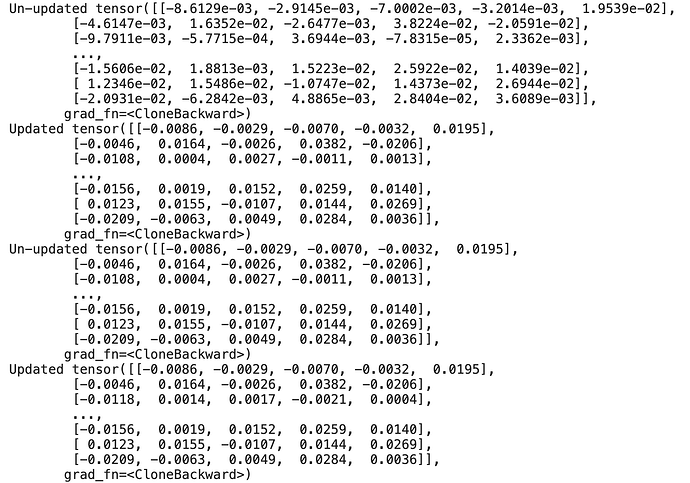I am working on a text classification problem with a binary output 0 or 1. The accuracy, train loss and test loss remains the same. The accuracy is exact the same for all the epochs. All the steps looks very correct. I had tried out several ways to figure out what is going wrong. Nothing actually worked. Please help.
class RNN(nn.Module):
def __init__(self, num_layers, num_classes, input_size, hidden_size,vocab,dropout):
super(RNN,self).__init__()
self.num_layers = num_layers
self.num_classes = num_classes
self.input_size = input_size
self.hidden_size = hidden_size
self.sequence_len = sequence_len
self.embedding = nn.Embedding(len(vocab),input_size)
nn.init.xavier_normal_(self.embedding.weight)
self.rnn = nn.RNN(input_size, hidden_size,num_layers,dropout = dropout, nonlinearity = 'tanh', batch_first=True, bias = True, bidirectional = False)
self.linear = nn.Linear(hidden_size, 1)
nn.init.xavier_normal_(self.linear.weight)
self.sigmoid = nn.Sigmoid()
def forward(self,x):
lens = list(map(len, x))
padded = pad_sequence(x, batch_first=True)
output_embedding=self.embedding(padded)
packed = pack_padded_sequence(input = output_embedding,lengths = lens, batch_first=True, enforce_sorted=False)
input_rnn = packed
h011 = torch.zeros(1,32,3)
output_11, hidden_11 = self.rnn(input_rnn,h011)
output_padded, output_lengths = pad_packed_sequence(output_11, batch_first=True)
final_output_11 = self.linear(hidden_11)
prob_11 = self.sigmoid(final_output_11)
return output_padded, hidden_11, prob_11
num_layers = 1
num_classes = 2
input_size = 5
hidden_size = 3
criterion = nn.BCELoss()
sequence_len = 1
dropout = 0.5
rnn = RNN(num_layers, num_classes, input_size, hidden_size,vocab,dropout)
epochs = 10
lr = 0.01
weight_decay=0.011
def train_loop(model,criterion,optimizer,train_loader,valid_loader,epochs):
train_losses= []
valid_losses= []
for epoch in range(epochs):
train_loss=0
for label,text in train_loader:
output,hidden,prob = rnn.forward(text)
prob = torch.tensor([item.item() for sublist in prob for item in sublist],dtype = torch.float32)
label = torch.tensor(label, dtype = torch.float32)
loss=criterion(prob,label)
optimizer.zero_grad()
loss.requires_grad = True
loss.backward()
optimizer.step()
train_loss += loss.item()
train_loss=train_loss/len(train_loader)
valid_loss=0
with torch.no_grad():
correct=0
total=0
for label,text in valid_loader:
output,hidden,prob = rnn.forward(text)
prob = torch.tensor([item.item() for sublist in prob for item in sublist],dtype = torch.float32)
label = torch.tensor(label, dtype = torch.float32)
loss=criterion(prob,label)
valid_loss += loss.item()
p = torch.tensor([1 if i > 0.5 else 0 for i in prob.data], dtype = torch.float32)
#predicted = torch.max(p, 1)
total += label.size(0)
correct += (p == label).sum().item()
valid_loss=valid_loss/len(valid_loader)
accuracy = 100 * correct / total
print(accuracy)
scheduler.step(accuracy)
train_losses.append(train_loss)
valid_losses.append(valid_loss)
print(f'Epoch {epoch+1:<2d}/{epochs} --> Train Loss: {train_loss:.4f} | Valid Loss: {valid_loss:.4f}')
from torch.optim.lr_scheduler import StepLR
from torch.optim.lr_scheduler import ReduceLROnPlateau
optimizer = torch.optim.Adam(rnn.parameters(), lr=0.01)
scheduler = ReduceLROnPlateau(optimizer, mode='max', factor=0.4, patience=5,
verbose=True) # need to change scheduler.step
train_loop(rnn,criterion,optimizer,train_loader,valid_loader,epochs)
